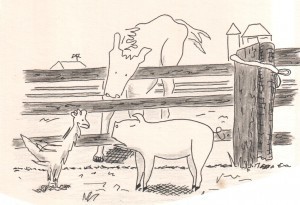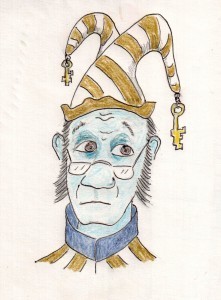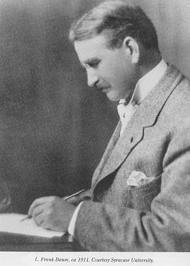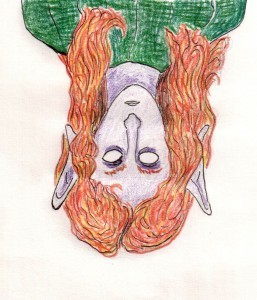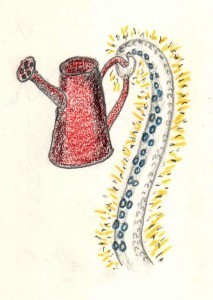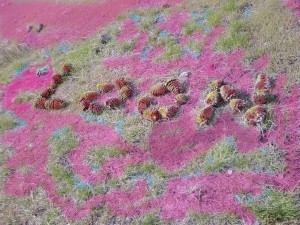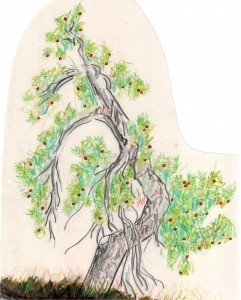Steve Shilstone's Blog, page 26
November 20, 2012
THE PIG’S POEM ALL ABOUT BEARS
“This is my poem all about bears.
It’s not about chickens. It’s not about pears.
It’s not about clumsily tumbling downstairs.
In fact, as I noted, it’s all about bears.
The first part’s about a grizzly and panda
taking high tea on a random veranda.
The next part’s about a white bear most polar
angrily suffering an impacted molar.
Part three is a summary, koala included.
If you look for a horse, you’ll be sadly deluded.
So that is my poem all about bears.
Next week I shall make one up about chairs.”
November 11, 2012
THE ADVERB AND RUTH PLUMLY THOMPSON
This is Ruth Plumly Thompson. She was chosen to continue L. Frank Baum’s Oz series after his death. I believe she wrote 18 Oz books in the 1920s and 1930s, and a very fine job she did. She carried on with great imagination, plots, characters, humor, and wordplay. She also loved adverbs. Adverbs positively preened in her presence. Not greatly respected in literary circles, adverbs were grateful beyond measure when Ruth sat down to write.
Here is the cover of my probably pretty valuable edition of Ruth’s 1922 Oz book, Kabumpo in Oz. And here are some happy adverbs performing in some of the story’s sentences:
1…said the Elegant Elephant shortly.
2…he said gruffly.
3…mumbled Pompador, looking up at a division sign curiously.
4…rapped sharply on the marble stone with his trunk.
5…as Kabumpo blinked angrily another red hot shower spattered into his ear.
6 & 7. So, slowly and painfully, Pompa counted…
I wish I could travel back in time and ask Ruth why she liked adverbs so much. I can even imagine my report of the interview. It would be written like this:
‘Why do you like adverbs so much, Ruth?’ I asked.
“What is my middle name?’ she Plumly replied.
November 3, 2012
THE LORD HIGH DULCIMER LIMERICK
The Lord High Dulcimer’s in a tizzy.
The weather’s gone wild. He’s awfully busy
running the show
from high to low.
He’s racing in circles. He’s making me dizzy.
October 27, 2012
L. FRANK BAUM, SESAME STREET AND ‘FOR’
From 1900 to 1920 there was no educational television. In fact, there was no television at all. Therefore, instead of Sesame Street and Mister Rogers’ Neighborhood, L. Frank Baum’s Oz books delighted and gently taught the best aspects of humanity to the children of the early 20th century, for he was a wonderful storyteller gifted with the narrative voice of a loving grandfather.
Now, did you notice how I used the word ‘for’ in that sentence up there? Mr. Baum’s Oz books are sprinkled through and through with ‘for’ as an alternative to ‘because’. I really like that, for ‘for’ is a short smooth glide of a word and ‘because’ is a chicken beginning to cackle sort of a word. Below are listed a few sentences from various Baum Oz books featuring our friend ‘for’.
Be contented with your fate, for discontent leads to unhappiness, and unhappiness, in any form, is the greatest evil that can befall you. – The Tin Woodman of Oz, 1918
For, had I eaten that fat baby, I would not now be the Hungry Tiger. – Little Wizard Stories, 1914
But the tree next to the lunch-box tree was even more wonderful, for it bore quantities of tin dinner pails, which were so full and heavy that the stout branches bent underneath their weight. – Ozma of OZ, 1907
But you see, the Land of Oz has never been civilized, for we are cut off from all the rest of the world. – The Wonderful Wizard of Oz, 1900
Perhaps it is better to be a machine that does its duty than a flesh-and-blood person who will not, for a dead truth is better than a live falsehood. – The Road to Oz, 1909
I almost wish the Flatheads would conquer us, for then we would be free of our dreadful Queen; but I do not wish to see the three transformed fishes destroyed, for in them lies our only hope of future happiness. – Glinda of Oz, 1920
Notice how I gave you a bonus ‘for’ in that last sentence? And aren’t you most curious about those three transformed fishes and just how it is that they carry the only hope of future happiness? Feel free to rush out and purchase Glinda of Oz, the final Oz tale written completely by L. Frank Baum.
October 20, 2012
THE JRABE LIMERICK
Ragaba’s a jrabe. She floats upside down.
Activity ceases when she glides through the town.
It’s no big surprise
with her milky white eyes
and her up falling hair and green satin gown.
October 15, 2012
AMUSING ALICE & ALICE: A MUSING
I recently reread Alice (‘s Adventures in Wonderland) and Alice (Through the Looking-Glass) and noticed two very different approaches to the structure of the narratives.
On the one hand, Alice (‘s Adventures in Wonderland) began as a story made up by Charles Dodgson to entertain the three Liddell sisters while they rowed the river on a lazy Oxford afternoon. Although Dodgson later padded and added to give us the final version still read today, he spun the tale as it occurred to him on the river, urged on and aided by the sisters’ Liddell, especially Alice. You can still see the ‘Tell us a story’ and ‘What happened next?’ there on the page.
On the other hand, Alice (Through the Looking-Glass) is quite structured, framed as a chess problem with a start (Alice, the pawn) and a goal (Alice, the Queen). A straightforward plot line carries through from beginning to end. Here is a story written by an Oxford don sitting alone at a desk, no insistent child prodding with a ‘What happened next?’
Both are delightful stories filled with puns and nonsense, one draped over a frame, the other floating free.
October 7, 2012
THE RACKETOUS GARL LIMERICK
The racketous garl is quite an odd creature.
Tentacles numerous are its outstanding feature.
Don’t venture too near.
If you do, well, I fear
with its great snapping beak it surely will eature.
October 1, 2012
DODGSON VS CARROLL
Here is a picture of a reproduction of a page in a story illustrated and written by the hand of Reverend Charles Dodgson as a Christmas present for Alice Liddell. Alice had insisted that he write down this particular story, the one about another Alice and the Queen of Hearts and the White Rabbit and all. On this page, Dodgson is telling what happens just after the caterpillar has left her alone by the mushroom, and she has nibbled on the mushroom, thereby causing her to begin shrinking. Dodgson writes:
‘She was a good deal frightened by this very sudden change, but as she did not shrink any further, and had not dropped the top of the mushroom, she did not give up hope yet. There was hardly room to open her mouth, with her chin pressing against her foot, but she did it at last, and managed to bite off a little bit of the top of the mushroom.’
Now, after Dodgson’s friend, George MacDonald, read the story, he encouraged Dodgson to publish it as a book, much to our delight. Dodgson turned himself into Lewis Carroll and added the March Hare and the Mad Hatter and another verse to ‘Beautiful Soup’ and other things, too, like pigs and peppers. As to Alice by the mushroom, he wrote:
‘She was a good deal frightened by this very sudden change, but she felt that there was no time to be lost, as she was shrinking rapidly; so she set to work at once to eat some of the other bit. Her chin was pressed so closely against her foot, that there was hardly room to open her mouth; but she did it at last, and managed to swallow a morsel of the left-hand bit.’
Why is Carroll’s version better than Dodgson’s?
Because Alice stops shrinking in Dodgson’s version, but continues shrinking and is in peril of shrinking away to nothing in Carroll’s version.
Moral: Edit, edit, edit.
September 26, 2012
NONSENSE POEM BY A LOON
Sometimes I jump up and down shouting, “Rice!”
It frightens the birds and scatters the mice.
Why do I do this? I know it’s not nice.
Oh well, time to stand on my head screaming, “Ice!”
September 21, 2012
THE FUZZLETONG LIMERICK
Berry productive is the fuzzletong tree.
Its berries are magic as magic can be.
To unfreeze the witch
without any hitch
a handful is rubbed on her face, not her knee.

